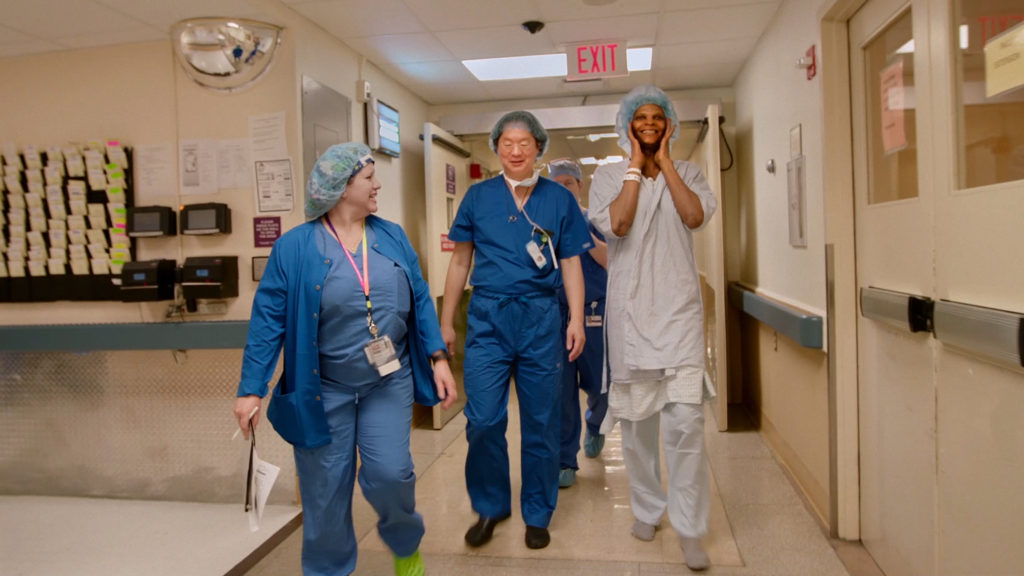Tânia Cypriano has been working between the United States and her native Brazil for over 25 years. Her films and videos have won international awards including Best Documentary at the Pan African Film Festival in Los Angeles, New York AIDS Film Festival, and Festival do Cinema Brasileiro de Gramado in Brazil. Cypriano’s first documentary, the short “Viva Eu!,” won five international awards including Best Documentary at Joseph Papp’s Festival Latino in New York. She is also the director of documentaries “Odo Ya! Vida com Aids,” and “Grandma Has a Video Camera.”
“Born to Be” will premiere at the 2019 New York Film Festival on September 28.
W&H: Describe the film for us in your own words.
TC: “Born to Be” is a documentary filmed in a period of over two years. We follow a plastic surgeon and a diverse group of patients at the Mount Sinai Center for Transgender Medicine and Surgery in New York City. Through incredible access, we get to witness Dr. Jess Ting learning new operations, and then becoming a leading doctor in the field of gender-affirming surgery. And through his patients, we see the impact of surgical transitioning for those who choose to do it.
W&H: What drew you to this story?
TC: Strong themes in my documentaries have been health and the body in the context of individuals and communities. There is a real divide in the trans community about surgical transitioning, but for those who need surgery, it’s important that they are respected and well taken care of. So I was really excited to explore that theme.
I was also taken by the genuine passion and commitment that producer Michelle Koo Hayashi brought to the project. She had recently learned about the high rate of suicide in the transgender community and hoped a film might help educate people — and encourage the community to see that change is coming.
W&H: What do you want people to think about when they are leaving the theater?
TC: Transgender and gender non-binary people’s issues are becoming more accepted in mainstream society, but we still have a long way to go in order to assure a positive future for the next generation. Health care should be part of the larger conversation. Medical education and transgender care are very far behind, and there is a huge lack of research on transgender health.
In this current administration, where health care is so fragile, we need to remind ourselves that our fight is everybody’s, and as a society we are stronger when we fight for everyone – because health care is a human right.
W&H: What was the biggest challenge in making the film?
TC: Having to respect many visions while keeping my own. Being focused on the opportunity to dialogue, and making sure that, whatever my choices were, that they could help open up positive discussions.
W&H: How did you get your film funded? Share some insights into how you got the film made.
TC: [Producer] Michelle Hayashi raised the funds for the initial phase of the film through a network of private donors. Arne Glimcher was the seed investor and supported the making of the initial trailer. In the later phases of the film, major supporters included J. Winkelried, the Jon and Abby Winkelried Foundation, and a grant from “Made in NY” Women’s Film, TV and Theatre Fund.
W&H: What inspired you to become a filmmaker?
TC: I believe a combination of a few things, but here I will list three: experimental films, the desire to speak up after being raised under military dictatorship in Brazil, and loving to hear my mother come back from the cinema and re-tell movies when I couldn’t see them.
W&H: What’s the best and worst advice you’ve received?
TC: Best advice: Not to pay too much attention to criticism.
Worst: “Go back to your country.”
W&H: What advice do you have for other female directors?
TC: Never hire people because they are the obvious choice or recommendation. What I mean is, if you are making a comedy, hire an editor who does horror movies. Take chances to make something nobody has made before.
W&H: Name your favorite woman-directed film and why.
TC: Only one?! The first that comes to mind is “Hour of the Star” by Suzana Amaral. It was the first film I ever saw directed by a woman, and it spoke to me in ways that I had never experienced before. Plus, it was based on a book by one of my favorite writers, Clarice Lispector.
W&H: What differences have you noticed in the industry since the #MeToo and #TimesUp movements launched?
TC: Personally, my struggles have always being more attached to me being an immigrant than to me being a woman.







